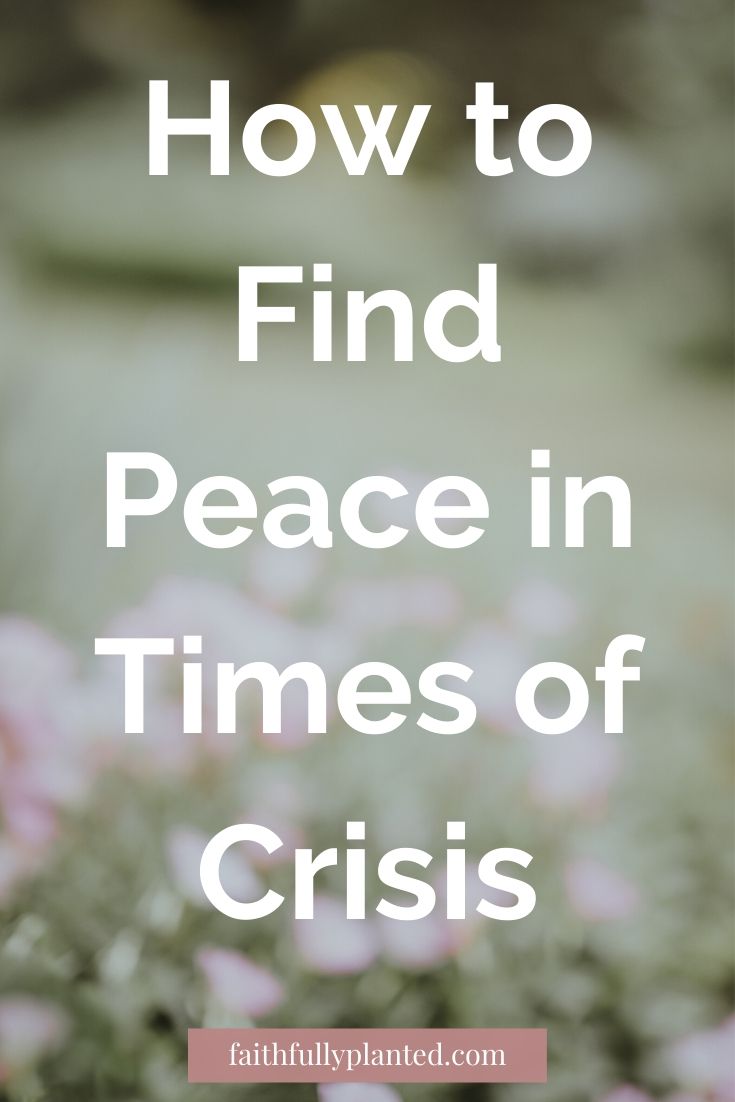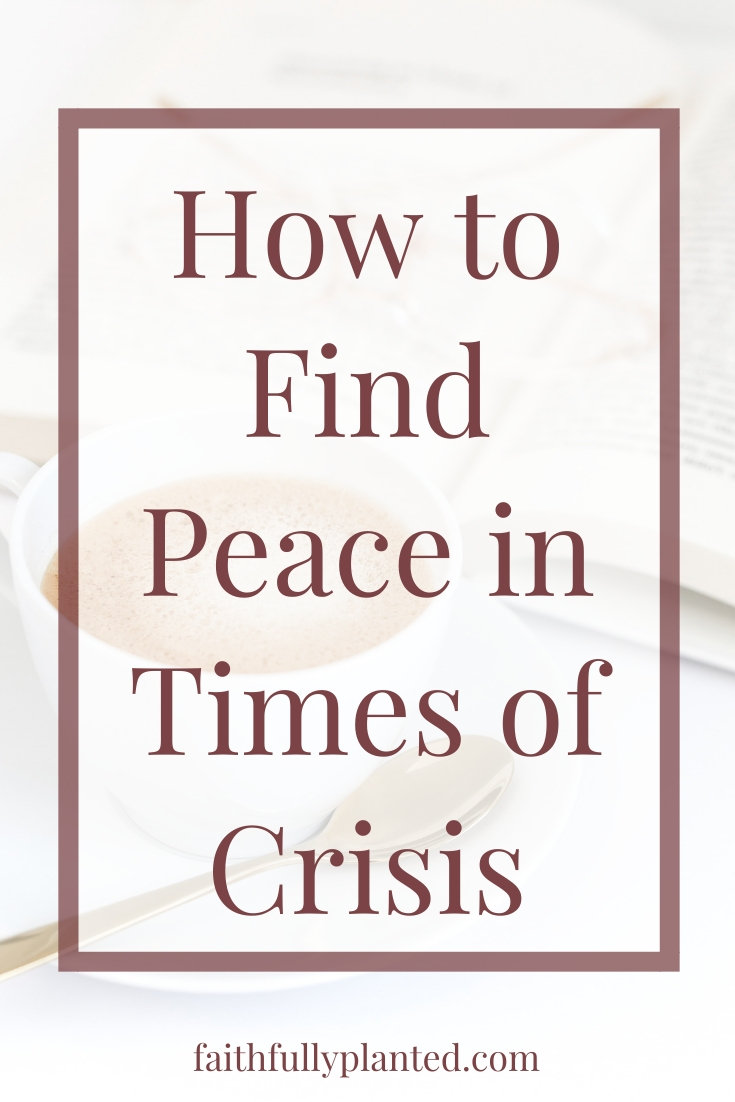
Are you struggling to find the kind of peace God’s word promises?
Are you in the midst of a crisis, or feeling overwhelmed by anxiety and a chaotic environment? Are you struggling with grim news at every turn about the state of the world or your community? If so, you are not alone.
We all go through times of crisis and are thirsty for God’s peace during those seasons.
At the time of this posting, we are dealing with the aftermath of a worldwide pandemic. Mental health issues are skyrocketing. We are starved for community and connection.
Many of us are trying to balance all of things while also keeping our relationships and souls healthy. Many of us have lost income, jobs, freedom, structure, and peace. Some of us have lost loved ones and are working through grief.
Peace may feel like something elusive right now, but it is not. God’s peace is supernatural and can be found even in the most chaotic of circumstances.

Here are just a few ways you can help yourself find peace during times of crisis:
1. Tidy up your space
I don’t mean deep cleaning. If you’ve got a full house, I know keeping up with cleaning may send you into an anxiety attack. What I’m talking about is removing the physical clutter from your space.
It may seem like I’m adding another chore to your to-do list, but truly, cleaning up your space will have a soothing effect on your soul and mind. You don’t have to declutter your whole house or clean it from top to bottom. Just pick 1 room or space, clear it of clutter or filth, and sit in the new peace of that space.
Little things can have big benefits like:
- Making your bed
- Gathering all of your laundry in baskets
- Loading the dishwasher and wiping off the counters
- Clearing your dining room table (aka the dump spot, am I right?)
- Clearing off your desk
- Picking up your living room
If you want to learn more about the peace-giving benefits of decluttering and keeping your space clean, check out AllieCasazza.com. She’s the guru for this and an advocate of minimalism with families and little kids.
2. Turn off the news
Staying informed is essential, but having the news on 24/7 is unhealthy.
If you’re like me, information is comforting to you. Taking in information can make you feel a little more in control, but friend, this is a false sense of control. Clinging to knowledge is us trying to do it in our own strength.
Check-in a few times a week to reliable sources to get what you need, but turn it off the rest of the week.
Many of us also get most of our news from social media, so the next tip will be especially important.
3. Get off of social media
Especially during quarantine, I was so guilty of scrolling social media and zoning out. It helped me to feel connected to other people and can absolutely be a positive thing in your life. But, spending hours upon hours a day on your phone or computer is not healthy.
Social media is one of the biggest robbers of our peace.
Too much investment here breeds comparison, anxiety, and depression for a variety of reasons. The good news about social media is we do have some control over what we see, who we follow, and what kind of content we interact with.
Take some time to do an audit of your social media and take captive the content you are consuming. Unfollow anyone or any page that isn’t encouraging you or cultivating connection for you. Mark any content you don’t want to see. Delete any apps that are especially triggering.
Use it for good, but be wary of falling into using it as a crutch or an escape.
RELATED: How to Use Social Media for Spiritual Growth
4. Don’t skip your Bible time
This one may seem obvious, but I cannot overstress its importance.
When we are in crisis, we often put the most helpful habits we’ve created on the back burner because we tell ourselves we don’t have the time or mental energy. We are in survival mode and those habits just don’t seem as important anymore.
But friend, do not neglect to get into God’s Word when you are in crisis. You may need to adjust your routine or rest in a devotional for the time being, but don’t let go of your Bible reading habits during a crisis.
Even if it’s only a few verses a day, even if you just camp out in the Psalms, your time invested in taking in God’s Word will payout in peace and comfort when you are struggling.
RELATED: 10 Simple Ways to Get into Your Bible Everyday
5. Seek encouragement and prayer from your circle
Even in times like these when we cannot physically gather, your people want to be there for you. They just need to know how you’re really feeling.
When someone checks in on you, don’t just tell them you are fine. Really let them encourage you and pray for you and share your heart.
In a crisis, we often try to put on a brave face.
We want others to see us as strong and able to handle whatever we’ve been given. But part of braving the storm is leaning on your support people. Part of being strong is letting others hold you up.
Galatians 6:2 tell us to “bear one another burdens, and so fulfill the law of Christ.”
That means we also have to let our burdens be borne by others. It goes both ways.
6. Move your body
This doesn’t have to be complicated or an intense sweat session (though those can be cathartic). This can simply be going on a walk, doing some stretches or yoga, or doing a light workout.
Getting outside while moving your body is an added bonus, as there are major health and mood-lifting benefits to fresh air and sunshine.
Often when we let our bodies get stagnant and sedentary, our souls follow suit. When we move our bodies, it can refocus our minds, shake the cobwebs from our souls and get our creative, productive juices flowing.
Exercise and movement pull your attention off of your anxious, negative thinking and refocus your mental energy on making your body move and balance and stay upright.
Also, exercise releases endorphins which are hormones that work with the receptors in your brain to reduce your perception of pain. God created our bodies, brains, and our hormones. It’s no coincidence that this natural mood-lifting hormone exists.
You can use this tool to lift your mood and reduce your stress levels, therefore, bringing more of God’s peace into your life.
7. Cultivate habits of stillness
Part of seeking after God’s peace is doing the work to create peace-bringing habits. When we’re struggling with anxiety and chaos in our lives, we often turn away from the habits that give us reduced stress and a heightened sense of peace and safety.
Something in us says we no longer have time or energy for what keeps us grounded and stable, but this is the time to lean into those even harder.
If you haven’t created any habits of stillness in your life, now is the time to pick one and implement it.
What are some habits of stillness?
- Journaling
- Gratitude practice
- Meditation
- Prayer (spoken or written)
- Yoga or light stretching
- Sitting outside, with no phone or other distractions
- Reading
- Deep breathing
- Engaging in worship
Find the things that keep you grounded in your faith and connected to Christ and cling to them in times of crisis. Ultimately, Jesus is our anchor in the storm. If we keep our hearts and minds focused on Him, seeking Him, we will find peace.
Your Sister In Christ,


